Dieting is hard. There are rules to follow, special foods to buy (plus lots of foods you can’t buy), apps to track it all with, coaches to check in with, support groups to attend, it just goes on and on.
That’s not easy. There’s a reason why diets entice you with the promise of 30 days or 3 months or some other predetermined timeline. You want to see that light at the end of the tunnel. It’s hard.
But you know what’s even harder?
Letting all of that go.
Yeah. Intuitive eating and the food freedom it brings, which might sound like what you so desperately want, can actually be harder than going on another diet. But let me explain why that shouldn’t keep you from trying.
[Tweet “#IntuitiveEating might be harder than dieting. Don’t let that stop you – here’s why”]
You give up your safety net
Diets are easy in the sense that you don’t have to think too hard to follow them. You might get a meal plan, a calorie limit, a food list, workouts, whatever. So much of the decision-making is done for you. That has its appeal – I can’t tell you the number of times I’ve heard, “Just tell me what to eat!”
But you are the only one who lives in your body. You are the only one who knows what it wants, what it needs, what makes it feel its best. No diet or trainer or health guru or dietitian can determine that for you. Diets essentially allow you to outsource the decision-making. You’re trading control for convenience but where does that get you?
Cutting loose from that safety net is tough stuff. It can feel overwhelming to suddenly be faced with endless decisions. Intuitive eating is basically asking you to jump into the unknown and trust that what you can’t see is better than what you can see. It’s scary and you might wonder, “What if I gain weight? What if my health gets worse?” But regaining confidence and trust is what empowers you to heal your relationship with food and finally achieve the health you’ve been seeking. Using the framework of intuitive eating and self-care, along with the guidance of someone who can help you shift your mindset and get your bearings back, is invaluable when it comes to creating a lifestyle you can truly sustain forever.
You’re probably going to have to defend it to everyone you know
Most people have not heard about intuitive eating. Although the concept has been around for ages (likely the way most people ate if you skip back a generation or two) and the term was born in the 1990s, it’s still like a little subculture within the wellness world. People may not understand it so they’re probably going to question it. And they’re probably going to try to draw comparisons to what they do understand, which is a diet.
So many diets have co-opted the terms “lifestyle” and “non diet approach” and twisted the meaning to still end up with a systematic method of controlling what or when someone eats. So if you tell someone you’re working on intuitive eating, what they might actually hear is “I’m trying another diet.” It might be tough to explain or articulate what intuitive eating is and isn’t. But if you can have a response ready for when you’re getting the third degree about your new “diet” you’ll feel more prepared and confident to face those questions.
Wondering if diets and dieting are the same thing? Read more in this post about why they can both be harmful for you and your relationship with food.
You might have to set (and enforce) boundaries with people you love
Intuitive eating encompasses physical, mental, and emotional health. So while you’re turning the focus on your physical health by healing your relationship with food, learning about gentle nutrition, and practicing self-care, you might also have to nurture your mind and spirit. Part of that involves setting boundaries. If you are unwilling or uninterested in discussing your weight, your body, or your health with someone you have to let them know. Our culture is accustomed to having someone’s body be a free space for comments or questioning. Hell, it’s even open grounds for touching (anyone ever feel crazy uncomfortable when a complete stranger is touching a pregnant woman’s belly?). So if this makes you uncomfortable or you just don’t want to go there, you don’t owe anyone an explanation or justification for why.
Setting boundaries is hard. It can be harder than sitting silent and letting comments or questions wash over you. But the empowerment you feel from standing up for yourself to let it be known what you will and won’t tolerate can be a pretty powerful feeling. That empowered feeling can trickle out and help you make more decisions or set other boundaries to protect your health. The physical, mental, and emotional pieces of it.
You have to build a shell of armor to deflect everything diet culture throws at you
From the things you read to the things you hear to the things you wear or buy, it can sometimes feel like the entire world is conspiring against you and your body. Tell you that it’s wrong or not worthy or needs to be improved. Everywhere you look there will be something that reminds you that you can be better if only…if only your shrink your body, if only you eat these foods, if only you commit to this gym, if only. Diets don’t sell health (otherwise we’d all be walking around feeling fabulous with no issues) but they sell hope. And they sell a culture or a way to belong.
One way is to start removing diet culture from your life. Eliminate the messages you can and take control of what you see and hear. Don’t buy magazines or diet books that promote dieting. Unfollow social media accounts that make you feel bad about yourself. And remember to set those boundaries with friends or family members that habitually talk about their diets or food.
You have to challenge your deepest thoughts and beliefs about food and health
This is another way to build your resiliency to diet messages and the cultures that surrounds you. Many of your deep-rooted beliefs about these things are actually false beliefs and with practice, you’ll become more skilled at quickly identifying them, reframing them, and moving on without so much as a second thought.
But that’s not an easy thing to do…you’ll be asking, “Why?” towards something you’ve believed to be true for a long time. Perhaps your entire life. Things like, “I can only be healthy if I lose weight” and “These foods are fine, but I’m being so bad if I eat [fill in the blank]”. Even behaviors get questioned, such as “I need to exercise every day this week to make up for what I ate this weekend.” Get brave. Ask those hard questions. If doing everything “right” (AKA dieting) has only left you feeling frustrated, unhappy, or struggling with food and health more than before, it begs those questions.
You might have times when the anxiety gets to be too much.
To not step on the scale, to not look at the calories in a food, to not head out the door to exercise even if you feel tired or sore and know you should let your body rest.
That’s OK.
Intuitive eating is not a win-lose game. It’s not about being perfect. It’s about the process and learning to trust yourself and your body again. Just because you learn about intuitive eating and practice it, for the most part, doesn’t mean there will never be a time when you catch yourself with a diet-y thought or reverting to a diet-y behavior. That’s just part of the process. The difference will be, you’ll be better able to spiral up and out of that, instead of spiraling down into shame, regret, guilt, or whatever else held you back before.
You will question yourself and the process and wonder if it’s all worth it.
I’m here to tell you it 100%, absolutely, without a doubt is worth it.
What would it be worth for you to move through this life without being obsessed with or controlled by food? What could you accomplish if your shame or anxiety about how your body didn’t hold you back? What would it mean for you to be able to walk into a room, see a birthday cake, and not feel instantly gripped by anxiety about whether or not to eat it and what you’ll have to do if you decide to take a slice? It doesn’t happen overnight. But if you can trust the process and yourself, there’s a way for you to see what it’s like to never say “I’m on a diet” again.
And if you’re looking for more support for a non diet approach and intuitive eating, be sure to check out my Intuitive Eating Workbook. It’s full of resources and tools to help you kick the dieting mentality and find food freedom!
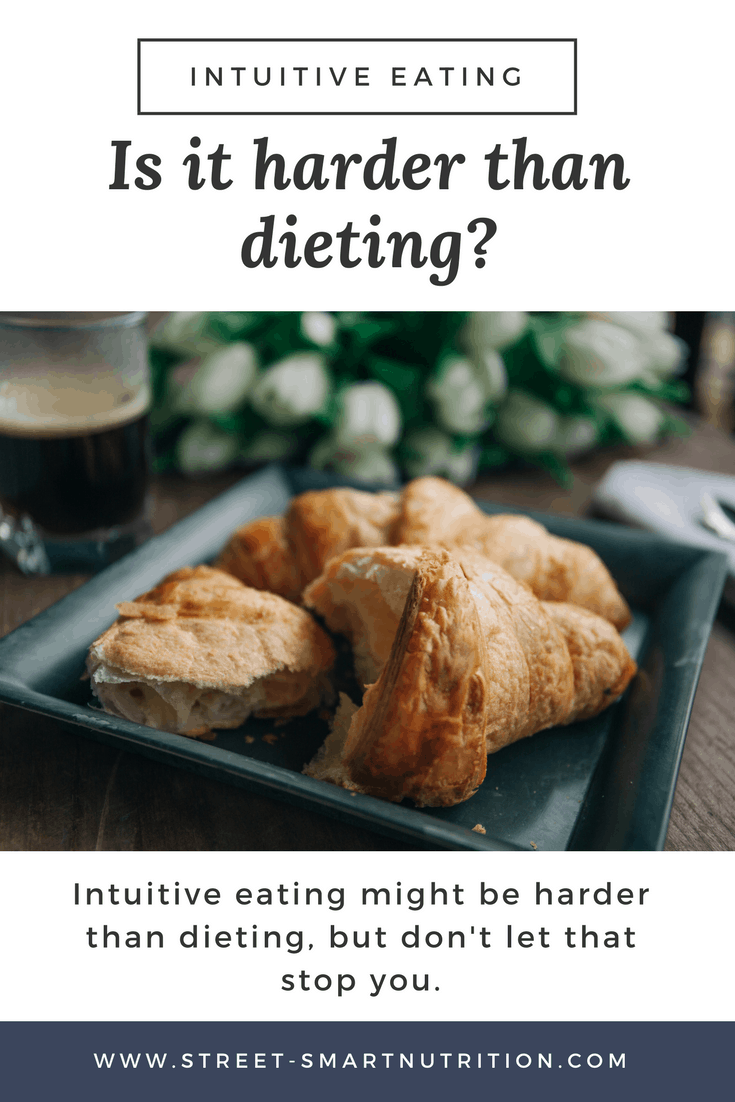
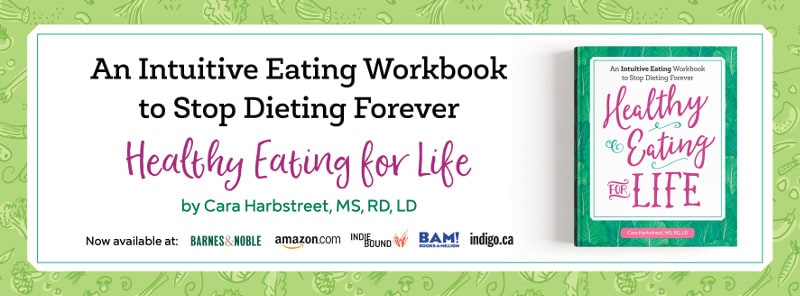
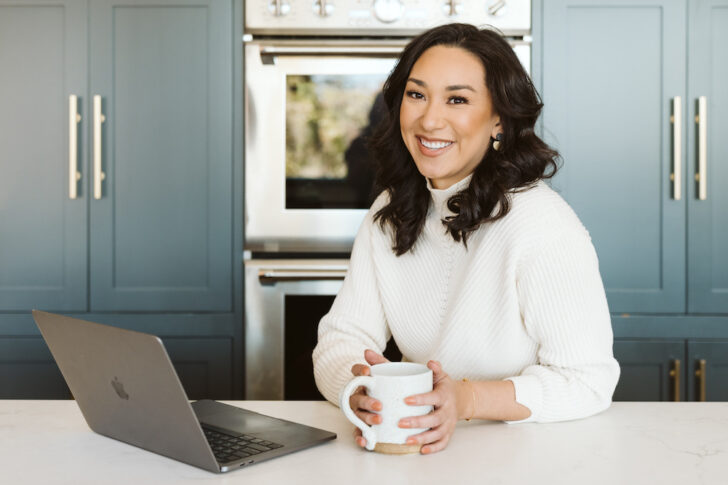
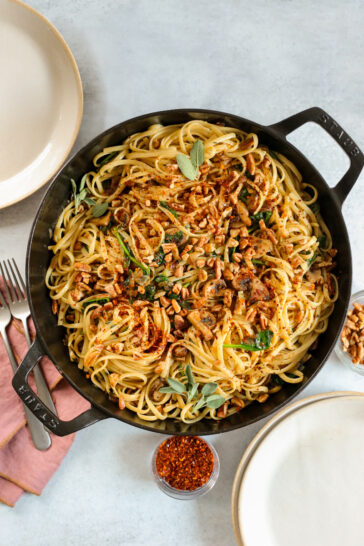
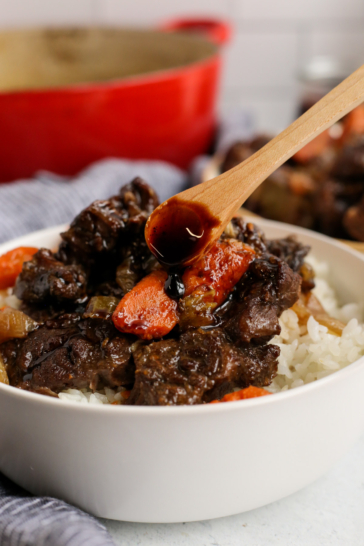
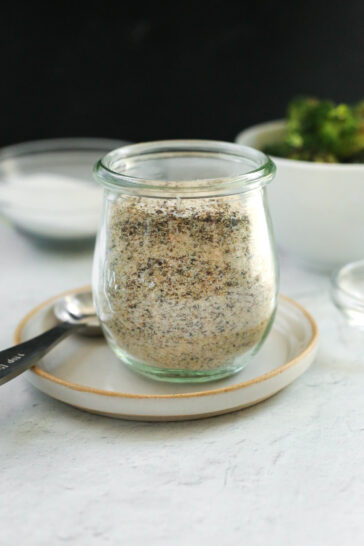
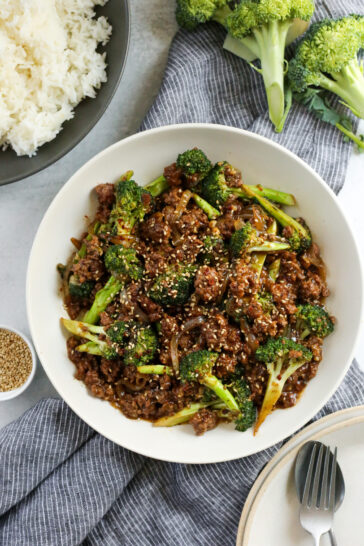
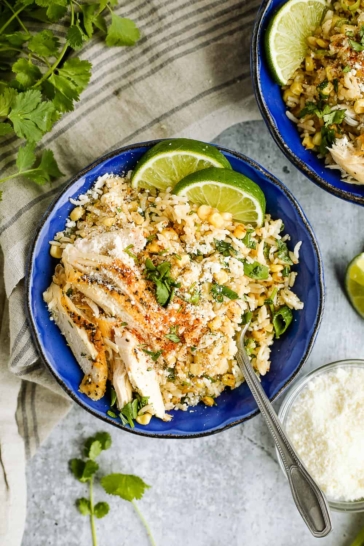
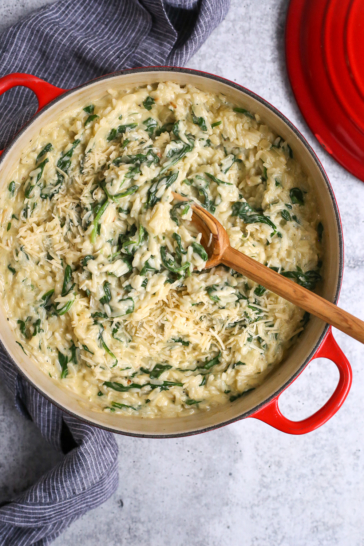



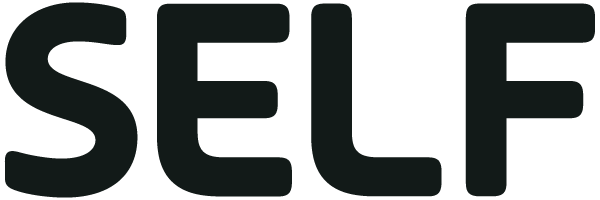



Questions & Reviews
Couldn’t agree more! Love this!
Thank you Erin!
Love this post, Cara! Letting go of diets may be tough in the beginning, but so, so worth it in the end!
Thanks Stephanie, it is SO worth it!
I’m learning a lot about intuitive eating, which is GREAT…. keep it coming!
This is such an important topic. Thanks for keeping it real – it’s not easy.
So interesting!
Thanks for this! It wasn’t until I was 21, after a diet in which I torturously and slowwwly lost 50 pounds and then very rapidly regained 70 (which established my setpoint for more than three decades) that I finally decided ENOUGH! But, of course, my continued fatness drew abuse from anti-fat bigots who routinely thought me to be a weak-willed lazy glutton. Health care “professionals” frequently lectured me. My own mother was quite embarrassed by “Harry’s weight problem”. I was a fat boy way back in the 1960s. The fat kids of today have it far worse than I did. They are regarded as part of an “epidemic”. I have great concern for them. And those who become fat later in life are forced to cope with derision and ridicule. And that’s Just Plain Wrong. Bigotry in *all* of its forms, sexism, racism, nationalism, religious intolerance, and political segmentation, is always and ever a barrier to the grasp of Interconnectedness.
Harry, thank you for sharing your experience. And I agree, size-ism and healthism, while not as obvious to some who do not experience it, are very real barriers